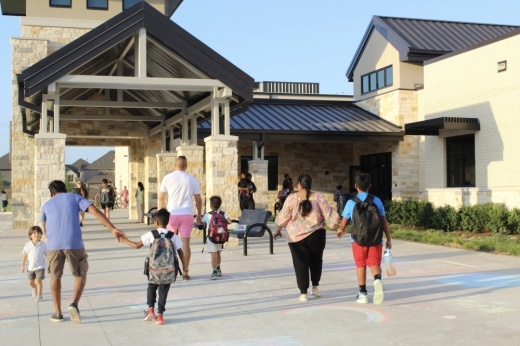Lawmakers have said these bills would help schools attract and retain educators. Over 12% of teachers left their jobs ahead of the 2023-24 school year, according to Texas Education Agency data, and nearly half of teachers cited discipline issues as a top workplace challenge in 2022.
On April 3, state senators unanimously passed a bill that would expand teachers’ disciplinary authority and give them more flexibility in their contracts, while the House Public Education Committee voted 13-1 to send to the full House a bill that would overhaul the state’s school discipline policies and make it easier for schools to suspend younger students.
“Somebody asked me, ‘What do you think the most important bill of the session is?’ And I said, ‘There's a lot of them, but if I had to pick one that maybe isn't always in the headlines... this is it,’” House Speaker Dustin Burrows, R-Lubbock, told Community Impact in an April 3 interview. “This has to be it. We have to have our teachers being able to be respected in the classroom and being able to restore discipline.”
At a glance
Senate Bill 27 would allow teachers to immediately remove from class a student who is “bullying others or is verbally abusive,” bill author Sen. Brandon Creighton, R-Conroe, said April 3 on the Senate floor. The bill would also prevent teachers from being penalized for breaking their contracts due to an illness or the relocation of a spouse or live-in partner.
To ensure teachers have enough time to fulfill their duties during work hours, SB 27 would direct districts and the TEA to study how much time teachers spend on non-instructional work and professional development.
Senators passed Creighton’s proposal with a 31-0 vote April 3.
“In recent teacher surveys, safety, classroom control and order were the most significant factors to teachers leaving the classroom,” Creighton said. “Senate Bill 27 aims to keep our classrooms an environment for learning, an environment that has order, an environment where all students have an equal opportunity to learn.”
Creighton noted that the Senate also passed legislation that would increase salaries for teachers with at least three years of classroom experience earlier this session. He has called the two measures a “teacher bill of rights,” which he said would help attract and retain educators.
House Bill 6, by Rep. Jeff Leach, R-Plano, would reverse a 2017 state law that generally prohibits schools from suspending students in pre-K through second grade. The bill would allow schools to remove from the classroom any student who is repeatedly disruptive or threatens the safety of others.
During a March 18 committee hearing, Leach said students who “assault a fellow student or a teacher” should not be allowed to stay in the classroom.
Leach’s bill would also expand schools’ ability to expel students for certain off-campus conduct, including aggravated assault, sexual assault, murder and arson.
HB 6 was sent to the House floor, where it is scheduled to be debated April 15.
“When you talk to our educators... about why they're leaving the profession, why they're not wanting their family to get into the profession, it's because they often have had an experience where they felt disrespected in the classroom and they couldn't do anything about it,” Burrows told Community Impact on April 3. “[HB 6] is aimed at trying to give teachers a bill of rights, trying to give them the ability to restore order.”
Zooming in
SB 27 would require teachers’ written consent before a student returns to their classroom and would direct the TEA to create a template for “return-to-class plans.” On the Senate floor, Creighton said these plans would not be required if a student was sent into the hallway or otherwise “briefly” removed from class.
HB 6 would not specifically mandate return-to-class plans. Once a student returns to the classroom, the bill would direct teachers to use classroom management strategies “that can reasonably be expected to improve the student’s behavior” and document additional behavioral issues.
A previous version of the bill sought to remove a time limit on in-school suspensions, allowing schools to use this disciplinary procedure for as long as they see fit—but after discussion during the March 18 hearing, Leach proposed limiting in-school suspensions to “10 days at a time.” State law currently stipulates that students cannot be suspended for more than three school days, whether they are inside the school building or at home.
Some Texans previously told the committee that removing the cap would isolate students.
“Sometimes behavior’s really serious, and for the health and safety of students, peers and colleagues, we gotta remove them—but that removal can’t be indefinite,” said Paige Duggins-Clay, an attorney for the Intercultural Development Research Association, an education policy nonprofit.
A separate Senate discipline bill, SB 1871, would allow schools to place students in an in-school suspension indefinitely. Under that proposal, long-term in-school suspensions would be reviewed at least every 15 days to ensure the suspension is appropriate and evaluate students’ educational progress. The Senate passed SB 1871 on April 10, according to Texas Legislature Online.
More details
In an attempt to help fill classroom vacancies, SB 27 would also waive fees for prospective teachers’ first certification exams in bilingual and special education.
A separate proposal by Creighton would offer stipends for teacher candidates who complete educator certification programs and require schools to pay early-career certified educators a higher salary than uncertified teachers with equivalent experience. That bill, SB 2253, was approved by the Senate Education Committee on April 9.
A far-reaching House proposal, HB 2, would give school districts $8,000 per year to help current and prospective teachers become certified.
HB 2 and SB 2253 would each prohibit districts from hiring uncertified educators to teach core subjects, such as math, English, social studies and science.
What they’re saying
Public school superintendents from across Texas testified in support of HB 6 during the March 18 hearing, noting a rise in serious classroom discipline issues in recent years.
“It’s very challenging to be in education now,” Cy-Fair ISD superintendent Douglas Killian told the House Public Education Committee on March 18. “This is my 22nd year as a superintendent, and I have so much respect for the teachers in our school district that are doing this day in and day out, because it’s so much harder than when I taught.”
Some Texans told the House committee that expanding suspensions for young students would harm children's progress and development.
“Young children make mistakes, and they’re still learning acceptable behavior and how to self-regulate,” said Adrian Fonseca, a teacher at Dallas ISD’s Montessori Academy. “Suspensions only push students further away from an environment where they can see and learn how to interact and behave appropriately.”





